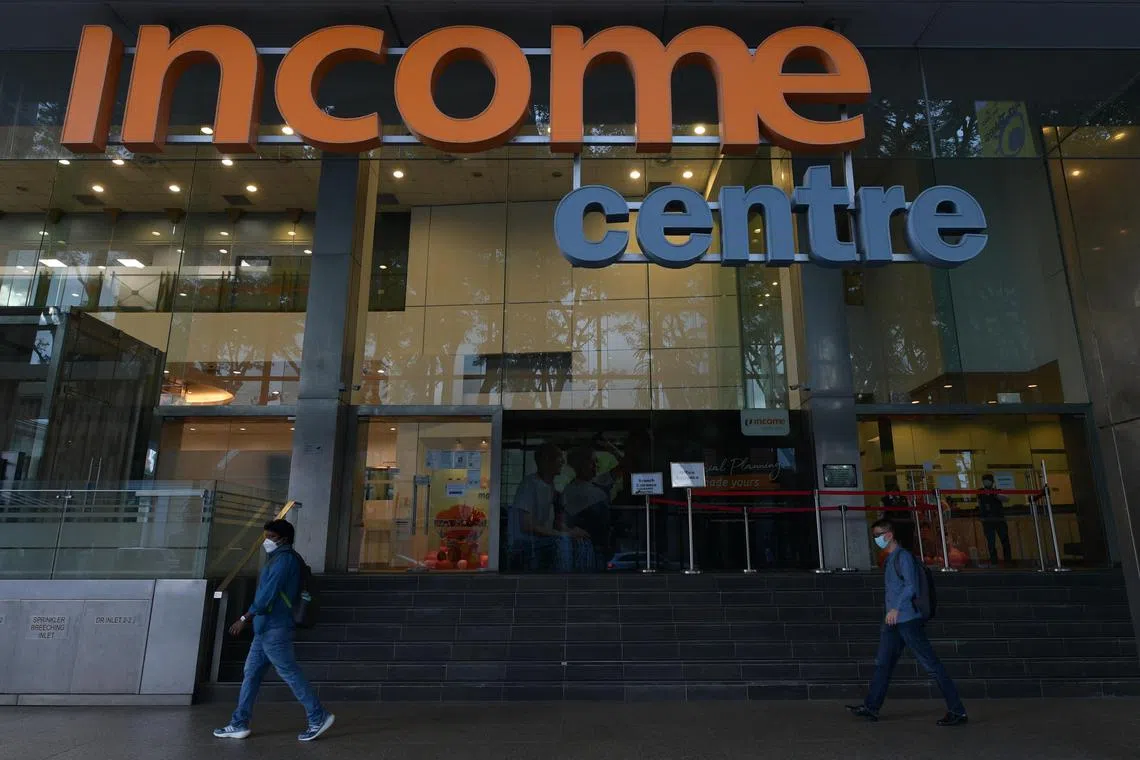Trading of Income shares will cease on Alta by Oct 17
Sign up now: Get ST's newsletters delivered to your inbox

German insurer Allianz has offered to buy at least 51 per cent of Income Insurance at $40.58 a share in cash.
PHOTO: ST FILE
Follow topic:
SINGAPORE – Around 16,000 retail investors struggling to cash out their shares in the unlisted Income Insurance will face an even tougher time once trading of the insurer’s stock on Alta’s digital securities platform ceases in October.
The quandary has arisen following German insurer Allianz’s offer on July 17 to buy at least 51 per cent of Income Insurance at $40.58 a share in cash
The Straits Times understands that a termination letter had been sent to Alta Exchange, a digital platform offering Income shareholders an alternative avenue to cash in their shares instead of going through the often tedious task of finding willing buyers themselves.
Alta was told by Income on July 15 that it has three months’ notice to suspend trading of Income shares within 24 hours of the termination date, which means Oct 17.
The move surprised retail shareholders, who hold 27.2 per cent of Income, or 28 million shares. They had been waiting for the second liquidity window to open for them to sell their stock following Allianz’s offer.
“It is as if they are trying to force retail shareholders of Income to take up Allianz’s offer,” said one shareholder. “If not, why shut the Alta avenue when the offer is only pre-conditional?”
Allianz has offered to buy at least 51 per cent of Income at $40.58 a share in a $2.2 billion cash deal. The deal, which is subject to regulatory approval, is expected to be closed in the fourth quarter of 2024 or in the first quarter of 2025.
The offer price is far higher than the $10 a share that some Income investors had reaped when they redeemed their stock under Income’s old cooperative structure.
It is also higher than the $19 a share recorded on Alta when the liquidity window for Income shareholders to sell the stock opened in January.
Allianz’s offer price represents a 37.3 per cent premium over Income’s net asset value per share of $29.55 as at Dec 31, 2023.
In the weeks running up to Allianz’s announcement, buying interest in Income shares had picked up on Alta. There were signs that the July 17 news of the Allianz offer prompted some investors to try their luck in buying shares at $19 a piece, the last traded price.
Still, some shareholders are confused given that the Income Insurance Share Liquidity Program was only launched by Phillip Capital and Alta in January to provide an easier avenue for them to cash out.
Mr Willie Chang, head of Alta Exchange, said: “Income Insurance continues to be listed on Alta Exchange. Buyers and sellers may continue to stay updated on the latest quotes and prices... and reach out to us for more information.”
Income’s retail shareholders want greater transparency when it comes to trading of unlisted public company shares such as Income’s.
Singapore has regulatory measures in place to prevent retail investors from dabbling in sophisticated investment products when they lack the financial means and knowledge to handle the risks.
But these restrictions are preventing ordinary shareholders from accessing market data required to gauge trading interest, investors said.
Unlike securities listed on a stock exchange, Income’s retail investors are unable to see all the related trading information, such as the bid and ask prices as well as the trading volumes.
“Without real-time pricing and trade data, the holders of Income Insurance shares investors would need to make a best-guess estimate on what price to sell,” Mr Kelvin Lee, co-founder and chief executive of Alta Alternative Investments told ST.
Demand for Income shares on Alta during the first liquidity window in January was three times oversubscribed.
However, many Income shareholders were hesitant to sell, citing a lack of transparency and accessibility to information surrounding the demand, and hence the potential selling price.
Potential buyers of Income shares were also unable to view order book data or a list of buy and sell orders for the shares arranged according to price.
These restrictions have impeded trading, said Mr Lee, who believes this conundrum facing holders of non-listed company shares is set to become more pronounced.
This is because a growing number of people in Singapore are employed by private companies and are beneficiaries of employee stock ownership programmes.
“While these stock or stock options appreciate in value, employees are hard-pressed to find ways of monetising them, as the shares of private firms are usually bound by policy measures and the firm’s own controls to manage the sale,” he said.
Even if private companies organise liquidity programmes to help employees cash out their shares, much of the information around the sale or purchase of stock remains inaccessible due to marketing restrictions on private equity.


